Haringey Community Paediatrics: Pathway for child with child protection concerns
Email for referrals: whh-tr.CP-Central@nhs.net
Who is this care pathway for?
This care pathway has been written primarily for families and carers of a child who has an emerging or identified concern regarding child protection.
This information in this page is also likely to be of interest and helpful for professionals as well.
Who do we see?
We see children and young people up to 18 years of age where there are concerns about possible abuse or neglect, who have an Haringey GP or attend a school in Haringey.
How to use this tool
When you scroll down you will see the information provided in this care pathway is set out in the following sections:
- Who we see?
- Who can refer and how?
- Care Pathway: gives a flow-diagram type overview of the pathway
- Detailed actions: sets out in more detail what is involved in the different parts of pathway
- Associated documents: more for use by professionals
- Resources: these are links to relevant web sites
- Quality standards: this is a list of the quality standards that we report on annually on this web site and these are designated by QS where they appear in the text
Child Protection Care Pathway
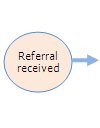 |
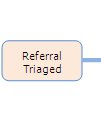 |
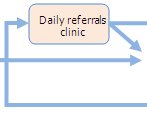 |
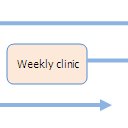 |
 |
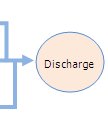 |
Detailed Actions to be Completed
| Referral received |
|
| Referral triaged |
Administration:
|
|
Daily referral clinics
|
|
|
Weekly clinic
|
Children seen in this clinic are either:
Otherwise the assessments undertaken and way of working is similar to that in the Daily referral clinic.
|
|
Non-acute Child Sexual Abuse
|
|
|
Discharged
|
|
Associated Documents
Resources
| Haringey Council - reporting concerns |
This link gives information on what to do if you are worried about a child for any reason.
|
| Working together to safeguard children |
A guide to inter-agency working to safeguard and promote the welfare of children (March 2015).
|
|
|
These procedures and practice guidance contains setions on core procedures, parctice guidance, threshold docunets, and amendments and archives. |
|
Haringey Local Safeguarding Children's Board
|
Haringey LSCB is a statutory body that helps all Haringey organisations who have contact with children, young people and their families to work together effectively in order to safeguard and promote the welfare of children and young people.
|
|
This NICE guideline covers the alerting features in children and young people (under 18 years) for physical, sexual and emotional abuse; neglect; abricated or induced illness.
|
|
|
The Gillick competency and Fraser guidelines help us all to balance childrenís rights and wishes with our responsibility to keep children safe from harm.
|
|
|
The Havens are specialist centres in London for people (children and adults) who have been raped or sexually assaulted.
|
Quality Standards Title
| QS-1 |
We will send out clinic letters within 2 weeks of the appointment
|
| QS-2 |
We welcome and actively seek feedback. This helps us to improve the service
|
|
|
Last updated26 Nov 2020

